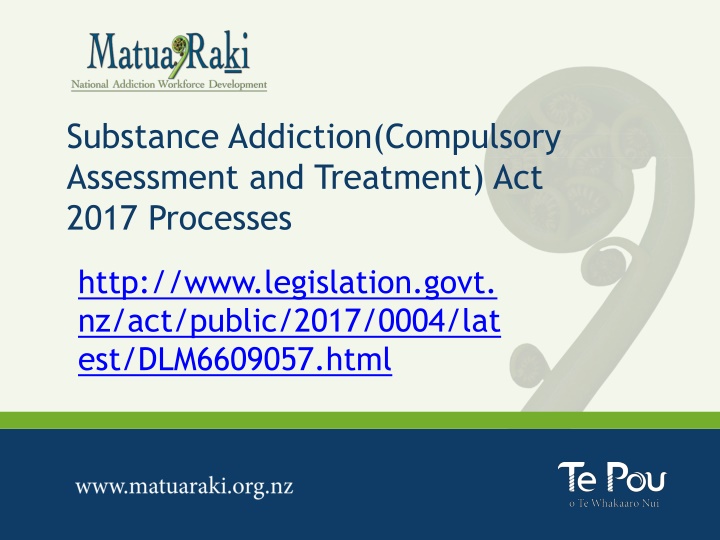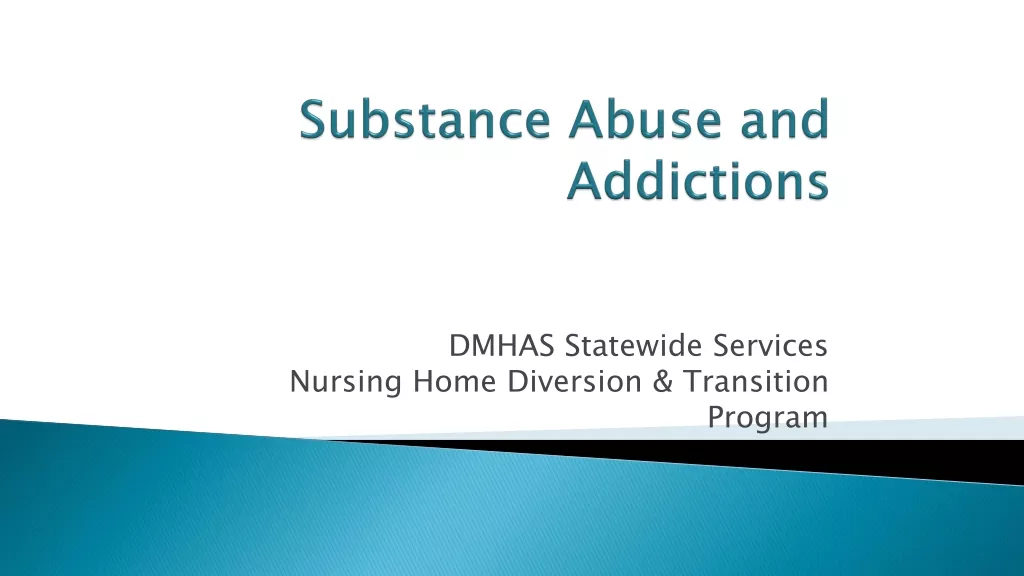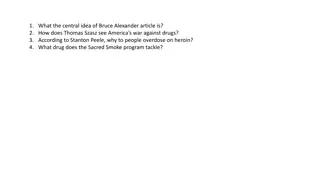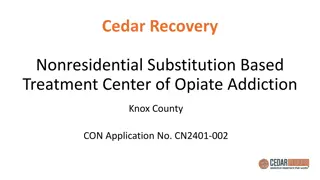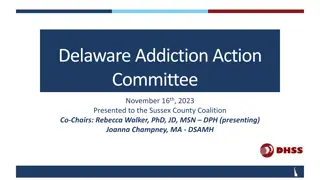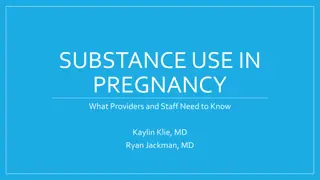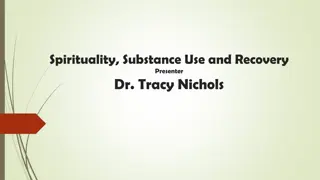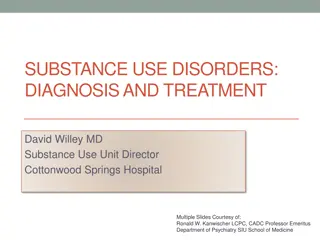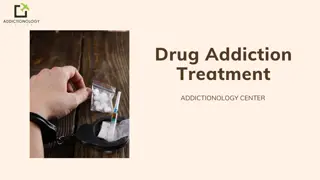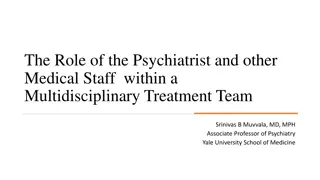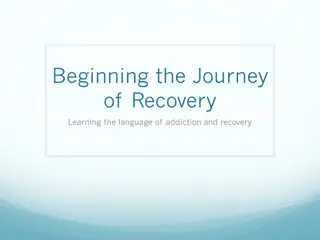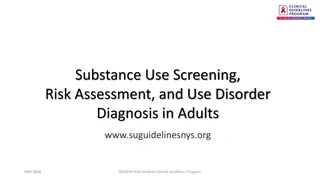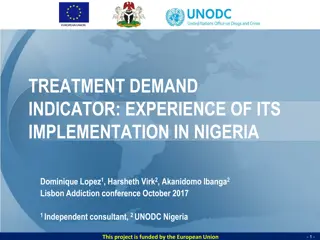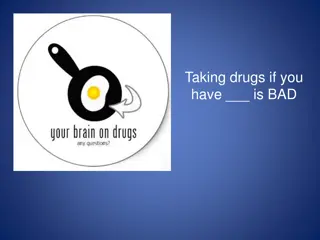Substance Addiction(Compulsory Assessment and Treatment) Act 2017 Processes
This Act outlines the processes for compulsory assessment and treatment of individuals with severe substance addiction in New Zealand. It covers the application process, criteria for compulsory treatment, involvement of authorised officers, and the role of medical practitioners. The Act emphasizes the necessity for compulsory treatment only as a last resort when voluntary treatment is ineffective.
Download Presentation

Please find below an Image/Link to download the presentation.
The content on the website is provided AS IS for your information and personal use only. It may not be sold, licensed, or shared on other websites without obtaining consent from the author.If you encounter any issues during the download, it is possible that the publisher has removed the file from their server.
You are allowed to download the files provided on this website for personal or commercial use, subject to the condition that they are used lawfully. All files are the property of their respective owners.
The content on the website is provided AS IS for your information and personal use only. It may not be sold, licensed, or shared on other websites without obtaining consent from the author.
E N D
Presentation Transcript
Substance Addiction(Compulsory Assessment and Treatment) Act 2017 Processes http://www.legislation.govt. nz/act/public/2017/0004/lat est/DLM6609057.html
Application Section 14 1. An applicant who believes that a person has a severe substance addiction may apply to the Area Director to have the person assessed under this subpart 2. The applicant must be at least 18 years of age.
Criteria for compulsory treatment Section 7 A person may be subject to compulsory treatment under this Act only if (a) the person has a severe substance addiction; and (b) the person s capacity to make informed decisions about treatment for that addiction is severely impaired; and (c) compulsory treatment of the person is necessary; and (d) appropriate treatment for the person is available Section 10 Compulsory treatment to be option of last resort For the purposes of section 7(c), compulsory treatment is necessary only if voluntary treatment is unlikely to be effective in addressing the severe substance addiction.
Authorised officer Section 16 1. At any time before making an application, the applicant may request the assistance of an authorised officer in arranging for a medical practitioner to examine the person whom the applicant seeks to have assessed. 2. The authorised officer must investigate the matter to the extent necessary to satisfy himself or herself that there are reasonable grounds to believe that the person whom the applicant seeks to have assessed meets the criteria set out in section 7(a) and (b).
3. If the authorised officer considers that there are reasonable grounds to believe that the person meets the criteria set out in section 7(a) and (b), he or she must make, or assist in making, arrangements for the person to be examined by a medical practitioner Section 17 2. If, after examining a person, the medical practitioner considers that there are reasonable grounds to believe that the person meets the criteria set out in section 7(a) and (b), the medical practitioner must issue a medical certificate under this section
However under Section 18 If attempts made by the authorised officer to have a medical practitioner examine the person have been unsuccessful, the authorised officer must, in a memorandum, (a) describe the attempts that have been made to have the person examined by a medical practitioner; and (b) explain why the attempts have been unsuccessful; and (c) state that the authorised officer considers that there are reasonable grounds to believe that the person meets the criteria set out in section 7(a) and (b); and (d) set out full particulars of the grounds.
Approved specialist Section 19 1. On receipt of an application under section 14 for the assessment of a person, the Area Director, or an authorised officer acting with the authority of that Area Director, must, as soon as practicable, make the necessary arrangements for the person to be assessed by an approved specialist.
Section 22 (2) In undertaking an assessment of a person, the approved specialist must first assess whether the person has a severe substance addiction. (3) If the approved specialist considers that the person has a severe substance addiction, the approved specialist must assess whether the person s capacity to make informed decisions about treatment for that addiction is severely impaired.
Section 23 Compulsory treatment certificate (1) If, after completing an assessment of a person under section 22, an approved specialist considers that the criteria for compulsory treatment are met, the approved specialist must sign a compulsory treatment certificate in respect of the person.
Responsible clinician Section 28 (1) As soon as practicable after the Area Director is notified under section 25 of the identity of a patient, the Area Director must assign a responsible clinician to the patient. (2) Wherever practicable, the Area Director must not assign as a patient s responsible clinician the approved specialist who signed the compulsory treatment certificate in respect of the patient.
Section 29 As soon as practicable after a responsible clinician is assigned to a patient, and in any case not later than the close of the seventh day after the patient s compulsory treatment certificate is dated and signed, the responsible clinician must (a) prepare a treatment plan for the patient; and (b) arrange for the admission of the patient to a treatment centre in accordance with section 30; and (c) apply to the court for a review of the compulsory status of the patient in accordance with subpart 6.
Section 30 (1) The responsible clinician must direct that the patient be detained and treated in a treatment centre. Section 32 (2) If the Judge is satisfied that the criteria for compulsory treatment are met, the Judge may, having regard to all the circumstances of the case, continue the compulsory status of the patient by making a compulsory treatment order (3) The compulsory treatment order expires on the close of the 56th day after the date on which the patient s compulsory treatment certificate was signed, and may be extended, under section 47, for a further 56 days.
Release from compulsory status Section 43 (1) The responsible clinician must promptly order, in writing, that the patient be released from compulsory status if the responsible clinician is satisfied that (a) the criteria for compulsory treatment are no longer met; or (b) no useful purpose would be served by the further compulsory treatment of the patient.
Plan for future treatment and care Section 44 (1) The responsible clinician must, if practicable, prepare a plan for the patient s release from compulsory status. (2) The plan must set out the responsible clinician s recommendation for future treatment, follow-up care, and any other action that the clinician considers appropriate.
Extension of compulsory status in case of patients with brain injuries Section 45 (1) If, at any time in the period beginning 21 days before the date of the expiry of a patient s compulsory treatment order, the responsible clinician considers that there are reasonable grounds to believe that the patient appears to suffer from a brain injury, the responsible clinician must review the condition of the patient.
Section 46 (2) An application to extend the compulsory treatment order must be made within 14 days before the date of the expiry of the compulsory treatment order that applies to the patient.
Section 48 (1) Before the close of the 28th day after the court orders the extension of a patient s compulsory treatment order, the responsible clinician must (a) prepare an updated treatment plan for the patient; and (b) take steps to investigate whether an actual brain injury can be confirmed or excluded; and (c) make arrangements for the future treatment and care of the patient in accordance with section 44.
Sections 49 60 : Patient rights The patient has the right: to be informed of their rights to nominate a person to protect their interests for their principal caregiver, welfare guardian, and/or nominated person to be informed of events affecting them to be dealt with in accordance with the objectives and principles of compulsory treatment to treatment to be informed about treatment to decline visual or audio recording to assessment by an independent approved specialist to independent legal advice to company to receive visitors and to make and receive telephone calls to receive and send mail and electronic communications.
